深圳牛津英语初一上学期知识点汇总
(牛津版深圳版)英语七年级上册词汇详解+练习(含答案)

1. grammar n.语法【衍生】阅读reading听力listening口语speaking/spoken English写作writing【考察项目】常规阅读和完形填空英语学习类文章出现【经典例句】①[牛津高阶字典]I find German grammar very difficult.我发现德语语法很难学。
②[牛津高阶字典]His pronunciation is good,but his grammar is terrible.他的发音不错,但他的语法极差。
2.sound n.声音v.听起来【衍生】感官动词总结:feel感觉look看起来smell闻起来taste尝起来listen to=sound【考察项目】辨析词:sound自然声音voice:人声noise:噪音感官动词+adj.sound+adj.【经典例句】①[课文原句]Learn to say the/i:/,/i/,/e/,/p/and/b/sounds.------学习去读/i:/,/i/,/e/,/p/和/b/这些音。
②[2015年沈阳]It sounds similar.这听起来很相似。
plete v.完成adj.完全的,完整的【衍生】pletely完全地complete=finish完成【经典例句】①[课文原句]Complete an email to a new friend.完成一个给新朋友的电子邮件。
②[牛津高阶字典]You can't leave until you complete the work.你们完成工作后才可以离开。
4.hobby n.爱好(hobbies)【衍生】对比:habit习惯学科:subject运动:sport【考察项目】写作题目:Having a good hobby is./My favourite hobby is.【经典例句】①[课文原句]Friends often write to each other about their hobbies.朋友们经常就他们的爱好写信给对方。
牛津深圳版英语七年级上册Unit 7 School clubs 重难点知识归纳总结

牛津深圳版英语七年级上册Unit 7 School clubs【重点单词】1.fair /feə(r)/ n. 展览会;展销会2.rocket /ˈrɒkɪt/ n. 火箭3.power /ˈpaʊə(r)/ n. 能;能量4.attend /əˈtend/ v. 参加5.teach /tiːtʃ/ v. 教;讲授unch /lɔːntʃ/ v. 发射7.disappear /ˌdɪsəˈpɪə(r)/ v. 消失;消散8.surprised /səˈpraɪzd/ adj. 吃惊的;感到惊讶的9.another /əˈnʌðə(r)/ pron. 又一;另一(事物或人)10.amazing /əˈmeɪzɪŋ/ adj. 令人大为惊奇的11.skill /skɪl/ n. 技术12.boring /ˈbɔːrɪŋ/ adj. 令人厌倦(或厌烦)的;乏味的13.headline /ˈhedlaɪn/ n. 大字标题rmation /ˌɪnfəˈmeɪʃn/ n. 消息;资料15.ant /ænt/ n. 蚂蚁16.butterfly /ˈbʌtəflaɪ/n. 蝴蝶17.bee/biː/ n. 蜜蜂18.recent /ˈriːsnt/ adj. 近来的;新近的【重点短语】1.learn about 学习2.all the way 一路上;自始自终3.of course 当然4.remote control 遥控器5.look up (在词典或参考书中)查阅,查检6.go for a walk 去散步7.see a film 看电影8.draw pictures 画画9.take photos 拍照10.listen to a talk 听演讲11.go on an adventure with sb. 和某人去冒险12.hurry to 赶往13.leave for 动身前往14.summer camp 夏令营15.take place 发生;举行16.in the countryside 在乡下【重点句型】st month, they attended the Clubs Fair.上个月,他们参加了俱乐部展览会。
完整版深圳牛津版英语七年级上重点词汇语法

Unit 1 Making friends1. Key wordsGerman hobby Germany world blog country mountain Japan grammar age elder flat sound dream friendly yourself complete US engineer everyone2. Key phrasesclose to live with go to school far away from... (be) good at do well in pay attention to sb./sth.make friends with all over get sth. from sb.’d like to do sth.=would like to do sth.let sb. do sth.ask sb. about sth.help sb.(to) do sth.tell sb. about sth. use sth. to do sth.best wishes write to sb. about sth,in one’s free time(be) friendly to sb.hear from sb./receive a letter from sb./get a letter from sb.3.Key language points1.) be from=come from2.)close to=next to, near3.)(be) good at=do well in4.)(be) friendly to sb。
5.) want to do sth.6.) make friends with7.) all over 遍布8.)’d like to do sth=would like to do sth.would like sth.would like sb. to do sth.4.Key grammarA. 特别疑问句1.疑问词what where who how how old when why which whose what time(问时辰 )how long how far how soon多快how often how many how much2.特别疑问句组成:特别疑问词+一般疑问句B.不定冠词 a/anUnit 2 Daily life1. Key wordsdaily bell article ring never end table tennis band ride practice usually together so market seldom guitar Geography grade break start2. Key phrasesjunior high school on foot take part in have a good time go to bed get up talk about between A and B(be) late for school brush one’s teeth ride a bicycle make notes add sth. to sth.at the end of take turns to do sth.arrive at/inhelp sb. with sth.Keep a diary remember to do sth.enjoy/love doing sth.3.Key language points1.) enjoy(doing) sth.2.) love doing sth.3.) ride (rode ridden)4.) end v. /n.5.) practice n. practise v. practise doing sth.6.) (be) late for7.) on foot8.) go to bed去睡觉go to sleep睡着了4.Key grammarA. 一般此刻时1.当谓语动词为实义动词时:一定句、否认句、疑问句、回答2.当谓语动词为 be 动词时:一定句、否认句、疑问句、回答B.频度副词和副词短语的使用1、频度副词使用时一般放在动词前always usually often sometimes seldom never2、频度副词短语使用时一般放在句末every day once a week twice a week all the time five times a year at the weekend every day/night/year/month...一、一般此刻时:【No. 1】一般此刻时的功能1.表示事物或人物的特点、状态。
(完整word版)深圳牛津版英语七年级上重点词汇语法(word文档良心出品)

Unit 1 Making friends1. Key wordsGerman hobby Germany world blog country mountain Japan grammar age elder flat sound dream friendly yourself complete US engineer everyone2. Key phrasesclose to live with go to school far away from... (be) good at do well in pay attention to sb./sth.make friends with all over get sth. from sb.’d like to do sth.=would like to do sth. let sb. do sth.ask sb. about sth. help sb.(to) do sth. tell sb. about sth. use sth. to do sth. best wishes write to sb. about sth,in one’s free time (be) friendly to sb.hear from sb./receive a letter from sb./get a letter from sb.3. Key language points1.) be from=come from2.)close to=next to, near3.)(be) good at=do well in4.)(be) friendly to sb。
5.) want to do sth.6.) make friends with7.) all over 遍及8.)’d like to do sth=would like to do sth.would like sth. would like sb. to do sth.4.Key grammarA.特殊疑问句1.疑问词what where who how how old when why which whose what time(问时刻) how long how far how soon 多快how often how many how much2.特殊疑问句构成:特殊疑问词+一般疑问句B.不定冠词a/anUnit 2 Daily life1.Key wordsdaily bell article ring never end table tennis band ride practice usually together so market seldom guitar Geography grade break start2.Key phrasesjunior high school on foot take part in have a good time go to bed get up talk about between A and B (be) late for school brush one’s teeth ride a bicycle make notes add sth. to sth. at the end of take turns to do sth. arrive at/inhelp sb. with sth. Keep a diary remember to do sth. enjoy/love doing sth.3.Key language points1.) enjoy(doing) sth.2.) love doing sth.3.) ride (rode ridden)4.) end v. /n.5.) practice n. practise v. practise doing sth.6.) (be) late for7.) on foot8.) go to bed去睡觉go to sleep睡着了4. Key grammarA.一般现在时1. 当谓语动词为实义动词时:肯定句、否定句、疑问句、回答2. 当谓语动词为be动词时:肯定句、否定句、疑问句、回答B. 频度副词和副词短语的使用1、频度副词使用时一般放在动词前always usually often sometimes seldom never2、频度副词短语使用时一般放在句末every day once a week twice a week all the timefive times a year at the weekend every day/night/year/month... 一、一般现在时:【No. 1】一般现在时的功能1.表示事物或人物的特征、状态。
深圳牛津版初中英语七年级上册8个单元全部词汇讲解+词汇近义词+同义词单选题
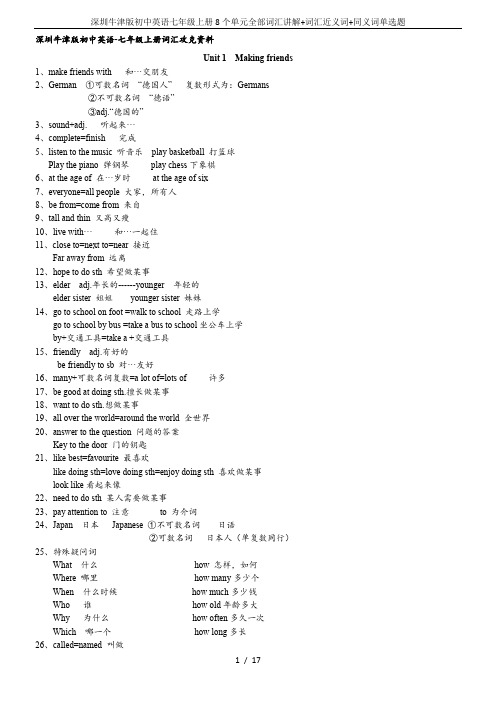
深圳牛津版初中英语-七年级上册词汇攻克资料Unit 1 Making friends1、make friends with 和···交朋友2、German ①可数名词“德国人” 复数形式为:Germans②不可数名词“德语”③adj.“德国的”3、sound+adj. 听起来···4、complete=finish 完成5、listen to the music 听音乐play basketball 打篮球Play the piano 弹钢琴play chess下象棋6、at the age of 在···岁时at the age of six7、everyone=all people 大家,所有人8、be from=come from 来自9、tall and thin 又高又瘦10、live with··· 和···一起住11、close to=next to=near 接近Far away from 远离12、hope to do sth 希望做某事13、elder adj.年长的------younger 年轻的elder sister 姐姐younger sister 妹妹14、go to school on foot =walk to school 走路上学go to school by bus =take a bus to school坐公车上学by+交通工具=take a +交通工具15、friendly adj.有好的be friendly to sb 对···友好16、many+可数名词复数=a lot of=lots of 许多17、be good at doing sth.擅长做某事18、want to do sth.想做某事19、all over the world=around the world 全世界20、answer to the question 问题的答案Key to the door 门的钥匙21、like best=favourite 最喜欢like doing sth=love doing sth=enjoy doing sth 喜欢做某事look like看起来像22、need to do sth 某人需要做某事23、pay attention to 注意to 为介词24、Japan 日本Japanese ①不可数名词日语②可数名词日本人(单复数同行)25、特殊疑问词What 什么how 怎样,如何Where 哪里how many多少个When 什么时候how much多少钱Who 谁how old年龄多大Why 为什么how often多久一次Which 哪一个how long多长26、called=named 叫做27、Would like to do=want to do想做···28、Other adj.其他的,另外的29、Best wishes!祝福用语30、lots of= a lot of 许多,大量的31、In one’s free time 在某人空闲时=in one’s spare time32、hope to do sth.希望做某事(不能说hope sb to do sth)33、hear from=get/receive a letter from 收到···的来信34、write to 给某人写信35、in English 用英语36、on the Internet 在互联网上Unit 2 Daily life1.listen to ·· 听···2. That’s right!正确!All right!好的That’s all right!=You’re welcome!没关系,不客气!3.频率表达:once 一次once a week 一周一次twice两次twice a week 一周两次Three times三次three times a week 一周三次三次以上:基数词+times4.brush my teeth 刷牙ride a bicycle 骑自行车Watch television看电视wash my clothes 洗衣服Play table tennis 打乒乓球play the piano弹钢琴5.love doing sth=like doing sth=enjoy doing sth 喜欢做某事6. Junior high school 初级中学Senior high school 高级中学Primary school 小学7.on foot=walk 步行Go to school on foot=walk to school 走路上学8.at+几点几分at 9:00在九点9.Start= begin 开始end 结束Start at··在··开始end at···在···结束10.be late 迟到be late for school 上学迟到11.different=not ··the same 和···不一样be different from…be the same as…12.in the world 世界上13.morning break 早间休息have a break=take a break 休息一下14.run to···朝···跑去15.Play games 玩游戏play with sb 和某人一起玩16.from···to···从···到····17.take part in=join in 参加18.have a good time=have fun=enjoy oneself 玩的开心19.a.m.上午p.m.下午20.after lunch 午饭后after school 放学后after school activities 课外活动between···and··· 在···和···之间in the morning/afternoon/evening在早晨/下午/晚上21.频率副词:always总是----- never从不(一对反义词)usually通常sometimes有时often经常---seldom 不常(一对反义词)对频率副词提问用:how often 多久一次22.at the end of··· 在···最后in the middle of··· 在···中间at the beginning··· 在···起初23.send sth to sb=send sb sth 送某人某东西24.close 关-------open 开25.do morning exercise 做早操26.go to bed 去睡觉go home 回家get up 起床have lunch 吃午餐have classes 上课27. teach sb sth=teach sth to sb 教某人某事28.arrive in+大地点=get to=reach 到达arrive at+小地点29.cook ①v. 烹饪②n. 厨师cooker n.厨具30.help sb with sth=help sb(to)do sth 帮助某人做某事31.prepare sth 准备某事prepare for··· 为···做准备32.around the world=all over the world全世界33.everyday=daily 每天的34.keep a diary 写日记35.think of···as··· 把···看做····36.tell sb about sth 告诉某人关于某事ask sb about sth 询问某人关于某事ask sb to do sth 要求某人做某事Unit 3 The Earth1.the Earth 地球Earth首字母要大写2.protect v.保护protection n.保护protect sb/sth from ···保护···免受···伤害3、report n.报道reporter n.记者4、be covered by 被···覆盖5、%---percent 百分之···70% 70 percentnd ①v.着陆②n.陆地7.there be 句型,使用就近原则,看第一个名词8.field n.田野,田地a football field 足球场9.under the ground 在地下in the air/sky 在空中on the land 在陆地上10、provide sb with sth=provide sth for sb 为某人提供某物11、pollution n.污染air pollution 空气污染pollute v.污染water pollution水污染12.put···into··· 把···倒入···put on穿上put away把···收好14、stop doing sth 停止正在做的事情stop to do sth 停止正在做的事情去做另外一件事15. It is+adj.+for sb+to do sth 对···来说做某事是···(it is adj+of sb to do sth)16. fact n.事实in fact 事实上17. what else···别的··· what else do you want? 别的你还想要什么18. ask sb to do sth 要求某人做某事ask sb not to do sth 要求某人不要做某事19、some 一些用于肯定句Some用于疑问句的特例:would you like some···?any 一些用于否定句和疑问句(用于肯定句表示任何)20、fewer and fewer 越来越少的比较级+and+比较级越来越···the 比较级,the 比较级越…越…21、catch fish捕鱼22、rubbish=waster 废物,垃圾23、throw away 扔掉throw into 把···扔进24、need sb to do sth 需要某人做某事need to do sth 需要做某事need doing sth 需要被···=need to be done25、smell n.气味v.闻taste n.味道v.尝feeling n.感觉v.感觉feelsound n.声音v.听26、keep sb +adj. 让某人···keep us alive 让我们活着27、lift···up 把··升起来28、in the end 在最后=at last=finally29、breathe v.呼吸breath n.呼吸Unit 4 Seasons1、Australia ①n.澳大利亚②adj.澳大利亚的Australian n.澳大利亚人复数:Australians2、like best=favourite 最喜欢的3、both 都(表示两者)All 都(表示三者或三者以上)4、feel+adj. 感到···feel hot 感到热5、What about you?=How about you?你呢?+doing6、Why not+V-原?=Why don’t you+V-原?为什么不···?7、watch sb do sth 看见某人做了某事(动作已经结束)watch sb doing sth 看见某人正在做某事(动作正在进行)8、leaf树叶----leaves(复数)knife小刀---knives(复数)Wife妻子---wives(复数)wolf狼---wolves(复数)9、what is the weather like?天气怎样?=How is the weather?10、in+时间(年份,月份,季节等)11、start to do sth=begin to do sth 开始做某事=start doing sth=begin doing sth12、get/turn +adj. 变得···get warm变得暖和13、It is exciting to do sth 做某事使人兴奋It is interesting to do sth 做某事很有趣It is nice to do sth 做某事很好It is adj. to do sth 做某事很···14、bright adj.明亮的brightly adv.明亮地Shine brightly15、go on a picnic=have a picnic=go for a picnic 去野餐16、at this time在此时at this time of year 在一年的这个时候17、dry干燥的-----wet潮湿的18、make snowmen 堆雪人19、snowy=snow+y adj.有雪的rainy=rain+y adj.有雨的windy=wind+y adj.有风的cloudy=cloud+y adj.多云的20、fall from··· 从···上掉下来21、spend time with sb 与某人一起度过(时光)= stay with sbspend doing sth 花时间/花金钱做某事22、have fun=have a good time=enjoy oneself 玩的开心23、fun n.乐趣funny =interesting adj.有趣的24、play in the snow 在雪地里玩耍25、heavy rain 大雨heavy snow 大雪rain heavily 下大雨26、lovely adj.可爱的friendly adj.友好的27、get married=be married 结婚28、on Monday morning 在周一上午29、red packet 红包30、the Spring Festival 春节during the Spring Festival 在春节期间during the winter holiday 在春节期间the Mid-Autumn Festival 中秋节the Dragon Boat Festival 端午节31、go+V-ing 表示从事某种活动或者行为go swimming 去游泳go shopping 去逛街32、in the north of+地点在···北部in the middle and east of China 在中国中东地区in the south - west of China 在中国西南地区33、different adj.不同的----difference n. 不同之处34、comfortable adj. 舒服的----uncomfortable adj. 不舒服的35、put forward 提前Unit 5 Visiting the Moon1、how far 多远对距离进行提问2、on+具体某一天on a clear night 在一个清澈的晚上in+上午/下午/晚上/年·· in the morning在早晨at+几点几分at 9:00 在九点3、the Moon 月亮the Earth 地球4、more than=over 超过5、one of+可数名词复数···之一6、travel into space 太空旅行7、leave for 动身去某地8、take···to··· 把···带到···去bring···back 把···带回9、around=about 大约10、in space 在太空中11、It takes one’s time to do sth 花费某人多长时间做某事12、be able to do sth=can do sth能够做某事not be able to do sth =can not do sth 不能够做某事13、have to=must 不得不don’t have to不必14、tie···to·· 把···栓到··上15、so that 以便,为了16、get weak 变得虚弱get+adj. 变得···be weak in 在···方面弱17、do exercises 做操18、float away 飘走float around 四处飘19、help sb (to)do sth 帮助某人做某事=help with sth20、on the Moon 在月球上21、take photos 照相=take pictures22、as···as I can 尽可能···23、love doing sth=like doing sth=enjoy doing sth 喜欢做某事24、enough+名词足够的enough money足够的钱enough+nbig enough足够大adj.+enough 足够25、Don’t worry!不要着急,别担心26、too many+可数名词复数太多···too many太多人too much+不可数名词太多···too much homework27、certainly=of course =sure 当然Certainly not=of course not 当然不28、exciting adj.令人兴奋的(指物)excited adv.兴奋的(指人)be excited about 对···感兴趣29、such as 例如for example 例如(用逗号隔开)30、一般将来时态结构:肯:will+V-原be going to+V-原否:will +not+V-原be not going to+V-原疑问句:Will···+V-原31、That’s a good idea!好主意32、something exciting!一些令人兴奋的事情something interesting!一些有趣的事情不定代词+adj.33、feed V.喂养feed sth to sb 用···喂···feed sb on sth 给某人喂食34、The early bird gets the worm.早起的鸟儿有虫吃。
牛津深圳版七年级上册英语期末复习Unit 1-Unit 8短语句型知识点汇总

牛津深圳版七年级上册英语期末复习Unit 1-Unit 8短语句型知识点汇总Unit 1 Making friends读:读一个德国女孩的博客听:听一个男孩询问一个女孩有关她的网友的情况语法:学习如何提问和回答特殊疑问句。
学习何时在名词前使用a或an说:学会发部分音素的音,告诉一些同学关于你自己的情况写:完成一封给新朋友的电子邮件A.短语归纳1.listen to 听2.play basketball 打篮球play the guitar 弹吉他3.be from=come from 来自4.close to 接近5.go to school 去上学go home 回家6.be good at=do well in 擅长be good for 对……有好处be good to 对……好be good with 善于应付……的7.make friends with 与……交朋友8.all over the world=around the world 全世界9.answers to these questions 这些问题的答案10.look like 看起来像be like 像11.pay attention to 注意12. a boy called/named 一个名叫……的男孩13.start with=begin with 以……为开始14.by bus 乘公交汽车(作状语)take the bus (作谓语)15.far away from 离……远16.lots of=a lot of 许多的,大量的a lot 大量,非常17.fly kites/fly a kite 放风筝18.hear from sb.=get/receive a letter from sb. 收到某人的来信19.in English/German/Chinese/Japanese 用英语/德语/汉语/日语20.best wishes 最美好的祝愿21.in one’s free time 在某人的空闲时间B.句型归纳1.be good at doing sth.= do well in doing sth. 擅长做某事2.like doing/to do sth. 喜欢做某事3.want 想要做某事would like 愿意做某事need to do sth. 需要做某事hope 希望做某事decide 决定做某事4.welcome to 欢迎来到5.how many+ 名词复数how much+ 不可数名词6.what do/does sb. do? 某人是做什么工作的?7.What do(es)…mean? ……是什么意思?8.one’s dream is to be… 某人的梦想是当……C.语法一、特殊疑问句1.定义2.句型结构二、不定冠词1.基本用法2.不定冠词的活用1)表示“一”这个数量,但数的概念没有“one”强烈2)用在时间或度量衡的名词前,表示单位“每一”3.不定冠词a/an的区别4.固定搭配5.不用冠词的情况Unit2 Daily life读:读一名学生关于他的日常生活的文章听:听一个男孩谈论他的周末语法:学习如何使用一般现在时。
牛津深圳版英语七年级上册Unit 1 Making friends 重难点知识归纳总结

牛津深圳版英语七年级上册Unit 1 Making friends【重点单词】1.German /ˈdʒɜːmən/ adj. 德国的2.grammar /ˈɡræmə(r)/ n. 语法3.sound /saʊnd/ n. 声音plete /kəmˈpliːt/ v. 完成5.hobby /ˈhɒbi/ n. 爱好6.country /ˈkʌntri/ n. 国家7.age /eɪdʒ/ n. 年龄8.dream /driːm/ n. 梦想9.everyone /ˈevriwʌn/ pron. 人人;所有人10.Germany /ˈdʒɜːməni/ n. 德国11.mountain /ˈmaʊntən/ n. 山;山脉12.elder /ˈeldə(r)/ adj. 年长的13.friendly /ˈfrendli/ adj. 友爱的;友好的14.engineer /ˌendʒɪˈnɪə(r)/ n. 工程师15.world /wɜːld/ n. 世界16.Japan /dʒəˈpæn/ n. 日本17.flat /flæt/ n. 公寓18.yourself /jɔːˈself; jəˈself/ pron. 你自己 n. 美国【重点短语】1.close to (在空间、时间上)接近2.go to school 去上学3.(be) good at 擅长4.make friends with 与……交朋友5.all over 遍及6.’d like to = would like to 愿意7.far away from 远离8.in one’s free time 在某人的空闲时间【重点句型】1.I live with my family in a house close to some mountains.我和我的家人住在一座靠近山的房子里。
2.My mum is an Art teacher.我的妈妈是一位美术老师。
牛津深圳英语七年级上册英语全册语法复习提纲(实用,必备!)
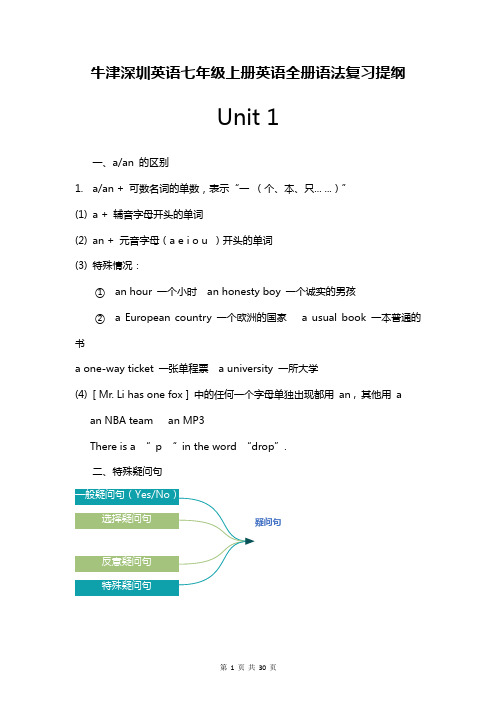
牛津深圳英语七年级上册英语全册语法复习提纲Unit 1一、a/an 的区别1.a/an + 可数名词的单数,表示“一(个、本、只... ...)”(1)a + 辅音字母开头的单词(2)an + 元音字母(a e i o u )开头的单词(3)特殊情况:①an hour 一个小时an honesty boy 一个诚实的男孩② a European country 一个欧洲的国家 a usual book 一本普通的书a one-way ticket 一张单程票 a university 一所大学(4)[ Mr. Li has one fox ] 中的任何一个字母单独出现都用an , 其他用aan NBA team an MP3There is a “p “in the word “drop”.二、特殊疑问句1.结构:特殊疑问词+ 一般疑问句2.常见的特殊疑问词:(1)What 什么(2)Which 哪一(个,本,页.......)(3)Why 为什么(4)How 如何,怎样(5)When 什么时候(6)Where 哪里(7)Who 谁whose 谁的(8)How long 多长(问长度),多长时间eg. How long is this room?How long do you stay in Shenzhen?(9)How far 多远(问距离)eg. How far is it from your home to your school?(10)How many:多少(问可数名词的数量)How many + 可数名词复数+ 其他?How many books do you have?How many people are there in your family?(10)How much 多少(问不可数名词数量);多少钱(问价格)问数量:How much + 不可数名词+ 其它?How much money do you have?问价格:How much + be(is/are)+ 物体?How much is this book?How much are these apples?(11)How often:多久一次(问频率)—How often do you go to school?—Five times a weekonce 一次twice 两次three times 三次four times 四次(12) How soon: 多快—How soon will you come back?—In two days.(13) How often:多久一次(问频率)How often do you go to school?你多久上一次学?Five times a week 一周五次once 一次twice 两次three times 三次four times 四次(14)How soon :多快(将来时)How soon will you come back?In four days 四天后3.(1)问天气:How is the weather=What is the weather like?(2)问年龄:①How old + be (is/are) + sb. ?②How old are you?③How old is your mother?④What ‘s sb’s age?(3)问工作①What be (is/are) + sb. ?②What is he?③What are you?④What do/does sb. do? What do you do?(3)问日期:what date is it today?=what is the date today? 今天是几号?(4)问星期:what day is it today?= what is the day today? 今天是星期几?(5)问时间点:What time is it now?= what is the time now? 现在是几点?Unit 2一般现在时:(和时间有密切关系)一、谓语1.我喜欢你主语谓语宾语他每天学习英语主语时间状语谓语宾语二、什么情况下可以使用一般现在时1.经常性、习惯性动作2.表示兴趣、爱好3.事物的一般特性4.客观事实、科学真理三、结构(一)谓语是be动词1.肯定句:主语+Be+其他I am a teacher. They are from China. He isgood at English(1)am 主语为I(2)is 主语为第三单(3)are 主语为you 和复数2.否定句:主语+Be +not +其他(1)I am not a teacher.(2)They are not from China.aren’t(3)He is not good at Englishisn’t(4)Xiaoming and I are not friends.aren’t3.一般疑问句:Be + 主语+ 其他?(1)Are you a teacher ? Yes, I am. No, I am not.(2)Are they from China? Yes, they are. No, they aren’t.(3)Is he good at English? Yes, he is . No, he isn’t.(4)Are xiaoming and you friends? Yes, we are. No, we aren’t.(二)谓语是其他动词1.肯定句:(1)主语+动词原形+其他(2)主语+动词第三单+其他(主语为第三单)I like you.He likes you.They go to school every day.He goes to school every day.2.否定句:(1)主语+don’t+动词原形+其他(2)主语+doesn’t+动词原形+其他(主语为第三单)I don’t like you.He doesn’t like you.They don’t go to school every day.He doesn’t go to shool.3.一般疑问句:(1)Do+主语+动词原形+其他?(2)Does+主语+动词原形+其他?(主语为第三单)Do you like me? Yes, I do. No, I don’t.Does he like you? Yes, he does. No, he doesn’t.四、时间标志词1.always(一直)usually(经常地)sometimes(有时)seldom(很少)never(从不)2.every (day, week, month, year......)3.once a day 一天一次twice a year 一年两次four times a week一周四次五、如何把动词变成第三人称单数1.在词尾+ “s”play—plays like—likes2.辅音字母+y结尾,改y为i,+ “es”study—studies cry—cries3.以s, sh,ch, x, o 结尾,+“es”go—goes wash—washes4.have—hasUnit 3名词:可数名词单数复数不可数名词一、如何把可数名词单数变为复数(一)规则变化1.+“s”cake —cakes pen—pens2.辅音+y结尾,改y为i,+“es”city—cities story—stories3.以s, x, sh, ch 结尾,+“es”box—boxes glass—glasses watch—watches4.以o结尾,有生命,+“es”tomato—tomatoes hero—heroes无生命,+“s”,zoo —zoos; photo—photos5.以f\fe 结尾,把f\fe 改为vesleaf —leaves knife—knivesroof—roofs safe—safes(二)不规则变化1.foot—feet tooth—teeth goose—geese man—men woman—women2.deer—deer sheep—sheep fish—fish Chinese—ChineseJapanese —Japanese3.child—children mouse—micea woman teacher two women teachers a man doctor two men doctorsan apple tree two apples trees二、不可数名词(一)常见不可数名词1.液体:water milk cola coffee tea juice orange oil2.可随意切割:meat beef chicken glass bread paper3.难分:sand rice hair4.气体:gas air(二)不可数名词的数量表达方法1.数字+量词+of+不可数名词a cup of tea 一杯茶two cups of tea 两杯茶2.常见量词:cup 杯glass 玻璃杯box 盒case 箱bay 袋/包basket 篮drop 滴piece 片、块、张pair 双、副、条3. a piece of paper two pieces of paper three pieces of paperThere be:有(某个地方有某物)1. There is a pen on the desk.2. There are two persons in the room.3.(1)There is a pen and two books on the desk.(2)There are two books and a pen on the desk.Have 有(某人有某物)I have a book. He has two sisters.Unit 4一、形容词(adj.).....的(一)一般修饰名词,放在名词前new pen beautiful house(二)修饰系动词,放在后面1.系动词(1)Be(2)感官动词: feel sound look taste smell(3)保持:stay keep remain(4)似乎:seem appear(5)变得:go get become turn grow二、如何把名词变成形容词1.+“al”person—personal 个人的nation—national 国家的nature—natural自然的centre—central 中心的2.+“y”(尤其和天气有关的)rain—rainy wind—windy snow—snowy fog—foggy luck—luckyhealth—healthy fun—funny3.+“ous”humor—humorous danger—dangerous4.+“ly”friend—friendly live—lively love—lovely week—weekly day—daily5.+“en”(和材料有关)wood—wooden gold—golden wool —woolen6.ce改为t silence—silent difference—different importance—importantconfidence—confident7.去e加y taste—tasty juice—juicy ice—icy8.+“ful”use—useful thank —thankful hope—hopeful care—carefulhelp—helpful9.+“less”(否定)care—careless hope—hopeless help—helplessuse—useless10.fool —foolish三、副词(adv.):一般以ly 结尾1.修饰实义动词(1)I run quickly.(2)He lives well.2.修饰一整句话,放在句首或句尾Luckily, he passed the exam.3.修饰形容词,放在形容词前He is specially handsome.四、如何把形容词变成副词1.+“ly”quick—quickly slow —slowly2.辅音+y结尾,改y为i,+ly happy—happily lucky—luckily3.以e结尾,去e加y possible —possibly gentle —gently4.形容词和副词同形:fast hard early weeklyUnit 5一般将来时一、使用条件:未来的某个时间将会发生的动作或存在的状态二、结构1.肯定句:(1)主语+will +动词原形(2)主语+be going to +动词原形(3)I will go to school tomorrow. I am going to go to school tomorrow.(4)He will visit you tomorrow. He is going to visit you tomorrow.2.否定句:(1)主语+will+not+动词原形(2)主语+be not +going to +动词原形(3)He will not visit you tomorrow.(4)I am not going to go to school tomorrow.3.一般疑问句:(1)Will +主语+动词原形?(2)Be+主语+going to +动词原形?(3)Will he visit you tomorrow? Yes, he will. No, i won’t.(4)Are you going to go to school tomorrow? Yes, I am. No, I am not.三、时间标志词tomorrow, next (week, month, year......) the day after tomorrowIn 2023 in+时间段in two days 两天后in a month 一个月后Unit 6if引导的条件状语从句一、句型If you study hard, you will pass the exam.If条件从句主句=You will pass the exam if you study hard.主句if条件从句二、①If you like sightseeing, you will love the beautiful place.②You can see many old buildings if you walk along the street.●情态动词:can 能could 能may可能might 可能need 需要must必须should 应该ought to 应该③Don’t stay there for too long if there are many people.●祈使句:(表示命令、要求、请求)A.结构:动词原形+其他Come in, please.B.Don’t +动词原形Don’t laugh. Don’t smoke hereC.let sb. do sth. Let me help you. Let us go.Unit 7一般过去时一、使用情况过去的某个时间发生的动作或存在的状态二、结构(一)谓语be动词1.肯定句(1)主语+be(was 单数/ were复数)+其他(2)I was a teacher ten years ago.(3)They were angry yesterday.(4)You were beautiful when you were young.2.否定句(1)主语+be+not+其他(2)I was not a teacher ten years ago.(3)They were not angry yesterday.(4)You were not beautiful when you were young.3.一般疑问句(1)Be +主语+其他?(2)Were you a teacher ten years ago? Yeas, I was. No, I wasn’t.(3)Were they angry yesterday? Yes, they were. No,they weren’t.(4)Were you happy when you were young? Yes, I was. No, I wasn’t.(二)谓语是其他动词1.肯定句(1)主语+动词过去式+其他(2)He played football yesterday.(3)I liked you ten years ago.2.否定句(1)主语+didn’t +动词原形+其他(2)He didn’t play football yesterday.(3)I didn’t like you ten years ago.3.一般疑问句(1)Did+主语+动词原形+其他?(2)Did he play football yesterday? Yes, he did. No, he didn’t.(3)Did you lie me ten years ago? Yes, I did. No, I didn’t.三、时间标志词XX ago: two days ago three weeks agoin 1995; last ( week, month, year.... )the day before yesterday四、如何把动词原形变成动词过去时1.+“ed”look—looked start—started2.以e结尾,+“d”live—lived hope—hoped3.辅音字母+y 结尾,改y为i加“ed”study—studied cry—cried4.辅+元+辅结尾的重读闭音节,双写最后一个字母,加“ed”stop—stopped plan—planned control—contolled skip—skipped5.不规则Unit 8人称代词指代人或物,有主格和宾格之分。
深圳牛津英语初一上学期知识点汇总
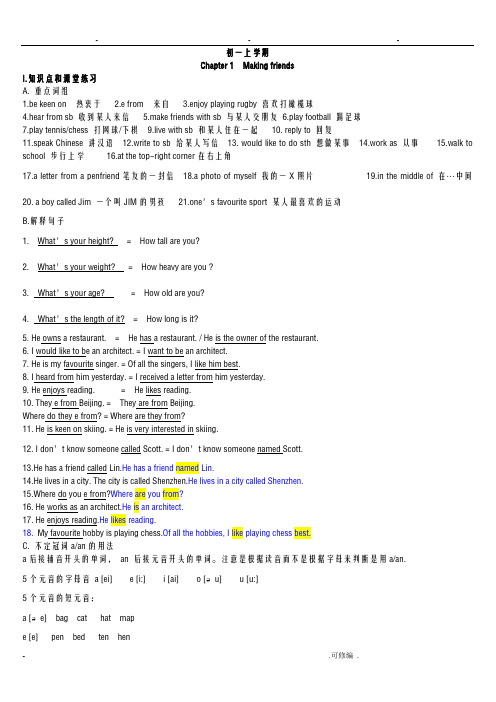
初一上学期Chapter 1 Making friendsI.知识点和课堂练习A. 重点词组1.be keen on 热衷于2.e from 来自3.enjoy playing rugby 喜欢打橄榄球4.hear from sb 收到某人来信5.make friends with sb 与某人交朋友6.play football 踢足球7.play tennis/chess 打网球/下棋9.live with sb 和某人住在一起10. reply to 回复11.speak Chinese 讲汉语12.write to sb 给某人写信13. would like to do sth 想做某事14.work as 从事15.walk to school 步行上学16.at the top-right corner在右上角17.a letter from a penfriend笔友的一封信18.a photo of myself 我的一X照片19.in the middle of 在…中间20. a boy called Jim 一个叫JIM的男孩21.one’s favourite sport 某人最喜欢的运动B.解释句子1.What’s your height? = How tall are you?2.What’s your weight? = How heavy are you ?3. What’s your age? = How old are you?4. What’s the length of it? = How long is it?5. He owns a restaurant. = He has a restaurant. / He is the owner of the restaurant.6. I would like to be an architect. = I want to be an architect.7. He is my favourite singer. = Of all the singers, I like him best.8. I heard from him yesterday. = I received a letter from him yesterday.9. He enjoys reading. = He likes reading.10. They e from Beijing. = They are from Beijing.Where do they e from? = Where are they from?11. He is keen on skiing. = He is very interested in skiing.12. I don’t know someone called Scott. = I don’t know someone named Scott.13.He has a friend called Lin.He has a friend named Lin.14.He lives in a city. The city is called Shenzhen.He lives in a city called Shenzhen.15.Where do you e from?Where are you from?16. He works as an architect.He is an architect.17. He enjoys reading.He likes reading.18.My favourite hobby is playing chess.Of all the hobbies, I like playing chess best.C. 不定冠词a/an的用法a后接辅音开头的单词,an 后接元音开头的单词。
牛津深圳版七年级上册英语期末必备考点梳理汇编

牛津深圳版七年级上册英语期末必备考点梳理汇编题型一语法选择必备考点(15个考点)考点1、时态考点一般过去时考频5次一般现在时考频2次一般将来时考频2次1.Wang Ming is ________ busy with his study, so he ________ has time for fun.A.always; seldomB. always; oftenC. usually; oftenD. never; never2、We _____ have a big dinner with my grandparents in Guangzhou Restaurant this New Year’s Eve.A.are going toB. will be going toC. are going to beD. will going to be3、—Do you _______ walk to school?—No, _______. I live too far away.A. often, neverB. usually, oftenC. seldom, alwaysD. always, usually4、We all love _______ table tennis, and we _______ a good time playing it yesterday.A. playing, haveB. to play, havingC. playing, hadD. play, had5、Forests _______ us with food and fruit.A. is providedB. providesC. provideD. providing6、Did you have two bowls of rice and an egg for lunch, too?--No, I _______ some dumplings instead.A. haveB. will haveC. have hadD. had考点2: 非谓语考频7次非谓语考点:(2)非谓语作宾语只能加非谓语to do形式:(常考)to do/doing作宾语均可,但含义有区别:(常考)非谓语的否定:否非1. We must stop ________ our rubbish into the sea and under the ground.A. to putB. puttingC. putsD. put2、When the teacher came in, he saw all of us _______ and laughing, so he was a little bit angry.A. talkB. talkedC. talkingD.to talk3、Many children enjoy ______ picture books in their free time.A. readB. to readC. readsD. reading4、--What’s your dream?--My dream is ____ a dancer.A. beB. to beC. becomeD. becomes考点3、冠词考频6次(先翻译,后语法)1、--- Where did you have _______ lunch? --- We went to _______ restaurant.A. /, aB. a, theC. the, theD. a, a2.I want to be ______ computer engineer in the future, so I work on my computer for more than ____ hour every day.A.a; aB. a; anC. a; /D. /; an3、I think we can have _______ great time during the School Art Festival.A.theB. aC. anD.不填考点4、人称代词考频9次A. UsB. MyC. OursD. Our2、Guangzhou is a beautiful city. _________ famous for ________ flowers and delicious food.A. Its; it’sB. It’s; itsC. Its; itsD. It’s; it’s考点5、名词考频3次1、--- What would you like to have for breakfast?--- I would like some milk and ________.A.two breadB. two breadsC. two pieces of breadsD. two pieces of bread2、There are _______ on the table.A. two milkB. two bottles of milkC. much milkD. two bottles of milks3、Here is my schoolbag. Two _______ and a ruler are _______ it.A. pencils, aboveB. homework, underC. paper, onD. books, in4、This band is from ______. All the people in the band are _______.A. Germany; GermanB. Germen; GermanyC. Germans; GermanyD. Germany; Germans考点6、形式主语考频6次1、_______ is important for us to listen to our teacher carefully in class.A. ThatB. ItC. ThisD. As考点7、特殊疑问句考频11次主要考察特殊疑问词和回答的一一匹配1、--- ________ do you watch TV, Tim?--- Every night.A.How soonB. How longC. How oftenD. How far2、. --- How often do you send an email to your cousin? --- _______.A. Last weekB. For a monthC. Once a monthD. Next week3、--_______ do you exercise? --Three times a week.A. How longB. How oldC. How oftenD. How soon4、________ coffee do you want?--A little, thanks.A. How manyB. How muchC. WhatD. Which 考点8、there be 考频8次1、There _______ a talk about American country music in our school tonight.A. will haveB. is going to haveC. is going to hasD. will be考点9、介词考频15次1、Playing computer games too much is bad ________ our eyes.A.atB. aboutC. ofD. for2、He always watches TV _______ his family after dinner.A. underB. withC. byD. without3、--- Hi, Linda. Are you writing _______ Tom? --- Yes. I _______ him yesterday.A. to, heard outB. to, heard fromC. with, hear fromD. from, hear out4、Dinner time is _______ 6:00 _________ 7:30.A. /; toB. at; toC. from; toD. at; and考点10、连词考频2次考点11、状语从句13 次1、Peter will call you if he ________ Guangzhou.A. get toB. got toC. gets toD. will get to2、If you _______ free, please come here tomorrow.A. wasB. will beC. wereD. are考点12、两花考频2次1、Every day I spend about two hours _______ my homework.A. to finishB. finishingC. finishesD. finish考点13、形容词,副词考频5次1、The basketball match was very great. We were all ________ about it.A.exciteB. excitesC. excitedD. exciting2、We are _______ in the _______ film.A. interested, interestingB. interesting, interestingC. interested, interestedD. interesting, interested考点14、代词a few、few、little、a little 考频3次1.1 a little 具备副词词性,其后可修饰形容词;2.3 a few、few、little、a little 具备形容词词性:(2)many/much 考频1次(3)代词other 考频2词(4)复合不定代词:考频4次考点15 其他考点(1)情态动词考频2次1、-Would you please ________ in front of me?--Sorry, I’d like _______ next to you.A. sit; to sitB. to sit; to sitC. sit; sitD. to sit; sit(2)感叹句考频1 次A. HowB. WhatC. How aD. What a(3)其他短语【2021花都区期末英语】语法选择(共10小题;每小题1分,满分10分)。
深圳七年级上册重点知识归纳
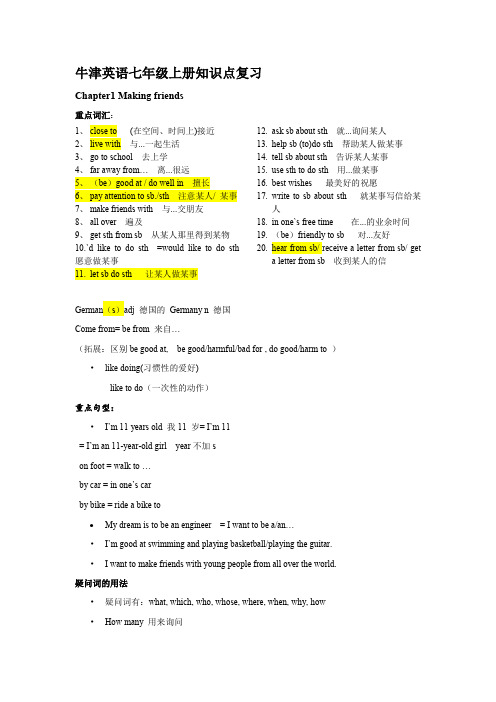
牛津英语七年级上册知识点复习Chapter1 Making friends重点词汇:1、close to (在空间、时间上)接近2、live with 与...一起生活3、go to school 去上学4、far away from… 离...很远5、(be)good at / do well in 擅长6、pay attention to sb./sth 注意某人/ 某事7、make friends with 与...交朋友8、all over 遍及9、get sth from sb 从某人那里得到某物10.`d like to do sth =would like to do sth 愿意做某事11.let sb do sth 让某人做某事12.ask sb about sth 就...询问某人13.help sb (to)do sth 帮助某人做某事14.tell sb about sth 告诉某人某事e sth to do sth 用...做某事16.best wishes 最美好的祝愿17.write to sb about sth 就某事写信给某人18.in one`s free time 在...的业余时间19.(be)friendly to sb 对...友好20.hear from sb/ receive a letter from sb/ geta letter from sb 收到某人的信German(s)adj 德国的Germany n 德国Come from= be from 来自…(拓展:区别be good at, be good/harmful/bad for , do good/harm to )•like doing(习惯性的爱好)like to do(一次性的动作)重点句型:•I’m 11 years old 我11 岁= I’m 11= I’m an 11-year-old girl year不加son foot = walk to …by car = in one’s carby bike = ride a bike toMy dream is to be an engineer = I want to be a/an…•I’m good at swimming and playing basketball/playing the guitar.•I want to make friends with young people from all over the world. 疑问词的用法•疑问词有:what, which, who, whose, where, when, why, how•How many 用来询问How much 用来询问•How often用来问可以回答once/twice /three times a….How soon询问how soon will you come back ? 你再过多久回来?- In a week . 再过一个星期。
(牛津版深圳版)英语七年级上册全册课文知识点(详细)
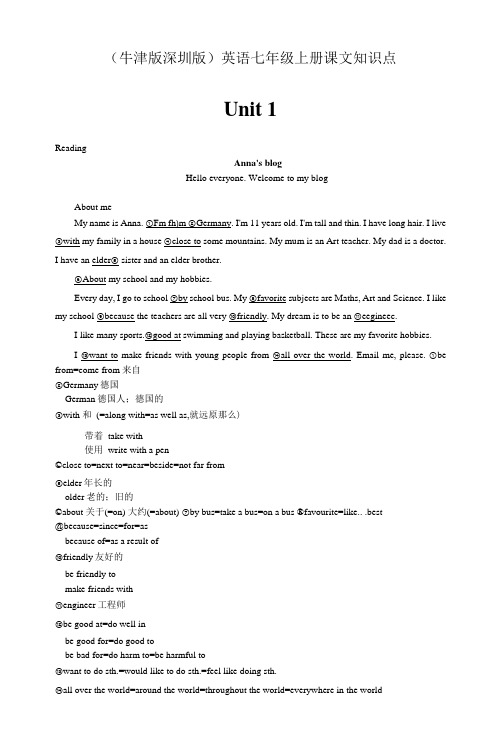
(牛津版深圳版)英语七年级上册课文知识点Unit 1ReadingAnna's blogHello everyone. Welcome to my blogAbout meMy name is Anna. ①Fm fh)m ②Germany. I'm 11 years old. I'm tall and thin. I have long hair. I live③with my family in a house ④close to some mountains. My mum is an Art teacher. My dad is a doctor.I have an elder⑤ sister and an elder brother.⑥About my school and my hobbies.Every day, I go to school ⑦by school bus. My ⑧favorite subjects are Maths, Art and Science. I like my school ⑨because the teachers are all very ⑩friendly. My dream is to be an ⑪eegineec.I like many sports.⑫good at swimming and playing basketball. These are my favorite hobbies.I ⑬want to make friends with young people from ⑭all over the world. Email me, please. ①be from=come from 来自②Germany德国German德国人;德国的③with 和(=along with=as well as,就远原那么)带着take with使用write with a pen©close to=next to=near=beside=not far from⑤elder年长的older老的;旧的©about 关于(=on) 大约(=about) ⑦by bus=take a bus=on a bus ®favourite=like.. .best@because=since=for=asbecause of=as a result of⑩friendly友好的be friendly tomake friends with⑪engineer工程师⑫be good at=do well inbe good for=do good tobe bad for=do harm to=be harmful to⑬want to do sth.=would like to do sth.=feel like doing sth.⑭all over the world=around the world=throughout the world=everywhere in the worldsouth-east 东南方north-east 东北方north-west 西北方12special 特殊的=unique=especial especially 尤其是13comfortable 舒服的-able 后缀14because原因状语从句Unit5ReadingA trip to space by Jerry 10 October 2053I'm so happy! Tomorrow Lil be① one of the first students to travel into space. The spaceship will② leave the Earth at 9 a. m. It'll③ take us to the Moon. I can*t ④wait!The Moon is ⑤around 380,000 kilometers from the Earth, so it'll take us about four days to get there. There's no gravity] in space, so well ⑥be able to float around the spaceship. We'll ©have to ⑧tie ourselves to our beds ⑨so that we won't ⑩float away in our sleep!⑪Without gravity, our bodies may ©get weak, so we!ll have to ⑬皿exercises every day.When we ⑭arrive,⑮I'm going to walk on the Moon. Til have to wear a spacesuit to⑯help me breathe because there's no air on the Moon. Tm going to take ⑰as many photos as I can, that is, ®if my camera still works up there...① one of the first student 第一批的其中一个one of the + 最高级②leave the Earth离开地球leave A for B离开A地方去B地方leave for A动身去A地方③ take sb to sw带某人去某地④wait for sb等某人wait to do sth等待去做某事⑤around = about大约周围⑥be able to do 二can do二have abilities to do sth 有能力做某事unable 不能够⑦have to do = must do必须做某事mustnft do禁止做某事⑧tie sth to sth把某事拴在某事上⑨so that = in order that = in order to 为了⑩float away飘走11without = if there is no 没有12get weak变得虚弱13do exercise 做锻炼+ 14arrive in +大地点arrive at +小地点15 be going to do = will do 将要去做某事16 help sb do sth 帮助某人做某事with the help of 在•…的帮助下17 as ... as I can = as... as possible 尽可能的,・・18 if 条件状语从句,如果……More practiceDo you want to ①spend your holidays in hotels on the Moon?②At the moment, there are no hotels on the Moon. But all this will change. If we can ③solve some problems, we will ④********************************************is very cold, so the hotels will have to be warm. They will also ©need ⑦ a large amount of air ⑧so that people there can breathe.The hotels on the Moon will have rooms ⑨with big windows so that you can ⑩ see the Earth. You will be able to swim in the hotel swimming pool and see ⑪all the starsaround you. But you ©should not ⑬get too excited . @A trip to the Moon will ⑮cost (16)a lot of money! spend one's time = kill one*s time 花费某人时间 at the moment 二 right now = at present 现在、当前 solve the problem = deal with 解决问题 be able to do 二 have abilities to do = can do 有能力做某事 in the future 未来 need to do = want to do 想要做某事 a large amount of = a great deal of = plenty of 许多,大量 so that = in order to =in order that 为 了with big windows with 携带,带着see / watch / notice / find 看,发现,找至llall the stars around you : around 在.・・・・周 围=aboutshould do = ought to do 应该做某事get excited / excitinginteresting / interested relaxing / relaxed14 a trip to 一个去.…的旅行15 cost 花费,主语是物a lot of 大量=lots of ①②③④⑤⑥⑦⑧⑨⑩u1213Unit 6Visiting ShanghaiShanghai is ① one of the largest cities in the world. ©If you like sightseeing , you will love it!People, s SquarePeople' s Square is G)in the center of Shanghai. It is a large public area ④ with green grass, fountains and birds. If you visit People' s Square, you can also see (5) famous buildings around it, ⑥ such as the Shanghai Grand Theater and the Shanghai Museum.The BundThe Bund is O where old Shanghai meets new Shanghai. If you -walk along the Bund, you will see many old buildings. The Pudong New Area, ©just across the Huangpu River, has many modern buildings. At night, these tall buildings light up thesky in every direction.Yu GardenYu Garden is a Qtraditional garden. If you enjoy history and Dnatural beauty, you will love this garden. There are many beautiful buildings, bridges and ponds. You can also buy Gdifferent snacks just Qoutside the garden.①one of +最高级+可数名词复数©if条件状语从句:主将从现G)center 中心,central 中间的④with带着@be famous for/as=be well known for/as 因…而知名/作为…而知名(6)such as = like = for example 例如Owhere :表语从句,在…(8)walk along/by 沿着/经过Q)go across =cross 穿过;across from = oppositeWin every direction 四面八方□ tradition 传统,traditional 传统的。
深圳牛津七年级英语上册Unit 1 Making friends知识点归纳及练习
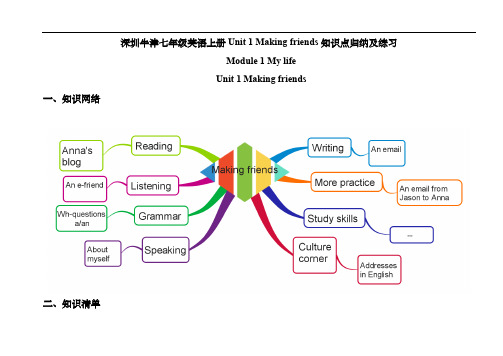
冠词 【考点一】区分用a还是an “a”用于读音以辅音音素开头的单词前;“an”用于读音以元音音素开头的单词前。
a student an apple 注意:是辅音、元音音素,不是辅音、元音字母。 【考点二】 以下单词以不发音的辅音字母“h”开头,但读音以元音音素开始,加“an”; an hour an honest man an honor 【考点三】 ③以下单词以元音字母“u”开头,但读音以辅音音素开始,加“a”; a university a unit a useful book 【考点四】有些字母的发音是以元音音素开始的,要用“an”修饰。这类字母有:a, e, i, o, f, h, l, m, n, s, x, r。 合成一个句子:Mr. Li has one fox. 提示:1. 易用错冠词的词:a one-eyed man(独眼人) a European
易错点 高频考点
4) My dream is to be … 5) How old is/are …? 6) What does…do? a/an 的选择 不定冠词 a/an 的选择 how many,how much,how often,how far, how long 等疑问词的提问
三、词汇清单 词汇: German Germany complete hobby country age
would like sb. to do sth
想要某人做某事。
2.I like my school because the teachers are all very friendly. because 常用来回答 why 引导的特殊疑问句。不能同时与 so 出现在一个句子中。
牛津深圳版七年级上册英语期末复习各单元知识点提纲

牛津深圳版七年级上册英语期末复习各单元知识点提纲Unit 1 Making friends8. I want to make friends from all over the world9. I like flying kites in my spare time.10. I hope to hear from you.IV. 单元语法--- 特殊疑问词及其释义一、概念:用疑问词引导的疑问句称为特殊疑问句。
特殊疑问句=疑问词+一般疑问句二、疑问词who——对“人”提问疑问词what——对“物”提问疑问词what+名词,对年级,班,排,学号,车号,星期等提问疑问词what对颜色,姓名,时间,职业,计算结果,“存在有”中的主语(人,物),天气,做什么(谓语和宾语),of短语提问疑问词which,对定语提问疑问词whose、whose+名词,对物主代词,名词所有格提问疑问词how 对身体,天气,程度状语、用...工具、用...语言等提问单元语法--- 定冠词a/an一、概念:冠词分为定冠词the,和不定冠词a/an 。
a/an 表示泛指,首次提到的、不限定的人或物,仅用作单数可数名词前。
二. 用法:a/an 用法及比较a 用于发音以辅音音标(不是以辅音字母)开头的单词前面。
an 用于发音以元音音标(不是元音字母)开头的单词前面。
Unit 2 Daily lifeI. 必记单词daily adj. 每日的;日常的seldom adv.不常;很少never adv. 从不ring v.(使)发出钟声,响起铃声ride v. 骑;驾驶End v. 结束;终止usually adv. 通常地practice n. 练习。
- 1、下载文档前请自行甄别文档内容的完整性,平台不提供额外的编辑、内容补充、找答案等附加服务。
- 2、"仅部分预览"的文档,不可在线预览部分如存在完整性等问题,可反馈申请退款(可完整预览的文档不适用该条件!)。
- 3、如文档侵犯您的权益,请联系客服反馈,我们会尽快为您处理(人工客服工作时间:9:00-18:30)。
深圳牛津英语初一上学期知识点汇总Document number【980KGB-6898YT-769T8CB-246UT-18GG08】初一上学期Chapter 1 Making friendsI.知识点和课堂练习A. 重点词组keen on 热衷于 from 来自 playing rugby 喜欢打橄榄球from sb 收到某人来信 friends with sb 与某人交朋友 football 踢足球tennis/chess 打网球/下棋 with sb 和某人住在一起 10. reply to 回复Chinese 讲汉语 to sb 给某人写信 13. would like to do sth 想做某事 as 从事 to school 步行上学 the top-right corner在右上角letter from a penfriend笔友的一封信 photo of myself 我的一张照片 the middle of 在…中间 20. a boy called Jim 一个叫JIM的男孩’s favourite sport 某人最喜欢的运动B.解释句子1.What’s your height = How tall are you2.What’s your weight = How heavy are you3. What’s your age = How old are you4. What’s the length of it = How long is it5. He owns a restaurant. = He has a restaurant. / He is the owner of the restaurant.6. I would like to be an architect. = I want to be an architect.7. He is my favourite singer. = Of all the singers, I like him best.8. I heard from him yesterday. = I received a letter from him yesterday.9. He enjoys reading. = He likes reading.10. They come from Beijing. = They are from Beijing.Where do they come from = Where are they from11. He is keen on skiing. = He is very interested in skiing.12. I don’t know someone called Scott. = I don’t know someone named Scott.has a friend called has a friend named Lin.lives in a city. The city is called lives in a city called Shenzhen.do you come from Where are you from18.My favourite hobby is playing all the hobbies, I like playing chess best.C. 不定冠词a/an的用法a后接辅音开头的单词, an 后接元音开头的单词。
注意是根据读音而不是根据字母来判断是用a/an.5个元音的字母音 a [ei] e [i:] i [ai] o [?u] u [u:]5个元音的短元音:a [?e] bag cat hat mape [e] pen bed ten henI [i] big pig sit hillo [?] box hot dog frogu [u] but mum bus mug12个单元音:短元音[?e] [e] [i] [?] [?] [u] [?]长元音 [i:] [?:] [a:] [u:] [?:]8个双元音:[ei] [ai] [?u] [au] [?i] [i?] [e?] [u?]一般而言,元音字母在单词中发元音,辅音字母在单词中发辅音,但偶有特例特例 an hour 一个小时 an honest boy一个诚实的男孩a university一所大学 a useful/useless thing 有用/无用的东西a European (cat) 一个欧洲人/一只欧洲猫 a usual day 平常的一天a one-day holiday 一天的假期2.特殊疑问词what什么(可以用来询问/职业/年龄/年级/号码/颜色/时间/价格/人口或是询问某人怎么了) what colour / what is your name(age/you number/favourite sport) /what time/what colour/what class/what day/ what is the population of /what is wrong with/what about/what do you think of ..when什么时间(大概的) what time 具体的时间where什么地点/who谁/whose谁的/which哪一…/why为什么how怎样◆ ---How do you go to school ---I go to school on foot.◆ --- How is your father---He is well now.how old多大年龄 how many多少(后接名词复数) how much多少(不可数);多少钱how long物体的长度;时间长度 ( for +一段时间 ) how soon多久以后( in+一段时间)---How soon will you go ---In two days.how often多久一次 ---How often do you brush your teeth ---Once a day.how far路程的长度 how tall(high)多高 how heavy多重◆---How far is it from Beijing to Guangzhou---It’s about 2000 km away.---It’s twenty hour's ride in train from Beijing to Guangzhou,but,so的用法and 表示并列的连接,用来连接对等的单词、短语和句子;but 用来表示转折关系;so 表示因果“因此,所以”◆because 和so 不可同时连用Because he felt tied, so he fell asleep soon. ( ×)Because he felt tied, he fell asleep soon. ( √)He felt tied, so he fell asleep soon. ( √) II. 课后练习Chapter two. Our daily lifeI.课堂知识点A.重点的词组in charge of 负责;管理 after 照顾 3. lose one’s temper 发脾气up 熬夜 5. brush one’s teeth 刷牙 6. go to school 上学 7. watch TV 看电视8. play table tennis 大乒乓球 a motorbike 骑摩托 the piano 弹钢琴 11. play computer games 玩电脑游戏 12. be similar to sb 和某人相似 different from 与什么不一样 at school 在学校上学 up 起床 a phone call to sb 和某人通电话 17. fail the exam 考试不及格 one’s way to school 在上学的路上19. in an hour or two. 在一到两小时内 18. attend the club 参加俱乐部补充:1. one of the top students 尖子生之一注意: one of + 可数名词复数2. put on / take off the school uniform 穿上/脱下校服 (强调动作)wear the school uniform 穿校服(强调状态)3. discuss business = talk about business 讨论生意4. drive sb to school/ work 开车送人去上学/上班5. make phone calls to clients = call clients = phone clients给顾客打电话6. achieve A grades = get A grades 取得A的成绩7. fail an exam/ pass an exam 考试不及格/ 考试及格fail to do 没有做成…succeed in doing sth 成功做…8. collect sb from a place 从…接人9. return to (a place) = go back to (a place) 返回某地 return home = go back home return sth to sb = give sth back to sb. 还东西给某人10. attend a club / a meeting/ a course 出席俱乐部的活动/会议/参加课程学习辨析:attend , join, join in , take part in 都表示“参加”,但搭配的短语不一样。
join + 团体、组织、党派如:join the army/ the Pary 参军/ 入党join in / take part in +活动、比赛如: join in / take part in the game/match 参加活动/比赛attend + 会议、课程attend a meeting = be present at a meeting. 出席会议11. have meetings / a meeting 开会12. assist sb with sth = help sb with sth 帮助某人做某事assist sb to do sth = help sb (to) do sth13. continue doing = go on doing = keep doing sth 继续做某事14. in an hour or two = in one or two hours 一至两小时15. be similar to 和…相似16. be different from = be not the same as 和…不同17. be the same as 和…一样18. on the way to a place , on one’s way to a place去某地的路上on the way home. 在回家的路上19. lose one’s temper with sb. = get angry with sb 发某人的脾气 (lose- lost) (get- got) have a good / bad temper 脾气好/坏20. take one’s temperature 量体温21.tell the truth 说真话 tell lies / tell a lie 说谎话区别: truth n. 事实,真理true adj. 真实的, 正确的 a true story 真实的故事 true or false 对还是错22. stay up (late) 熬夜stay up doing sth 熬夜做某事(经常性的或已发生)stay up to do sth 熬夜去做某事 (还没有发生,计划去做)23. look after sb = take care of sb 照顾某人24. be in charge of = be responsible for 负责;管理B.解释句子discuss business at talk about business at breakfast.driver drives me to school in a driver drives me to school by car.sometimes make phone calls to clients on the way to school.I sometimes call clients on the way to school.never fail an always pass an exam.I return to I go back to school.students often ask me to assist students often ask me to help them.I continued working on my I went on working on my games.is one of the top students in is one of the best students in Shenzhen.is different from her is not the same as her sister.is in charge of his is responsible for his company.11.He looks after his little takes care of his little brother.12. He tells the doesn’t tell a lie.doesn’t often lose his temper with isn’t often angry with others.B.一般现在时的构成1. Be 动词的肯定(否定)句的构成:主语(I/单数/复数)+BE( are)+(not)+其他。
